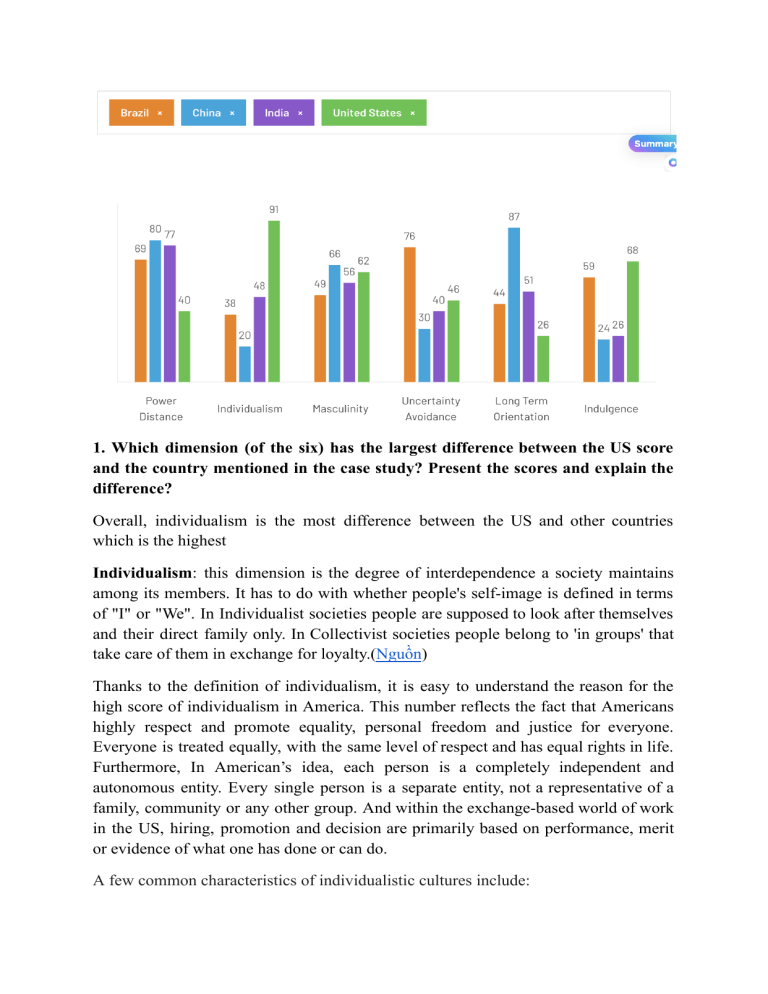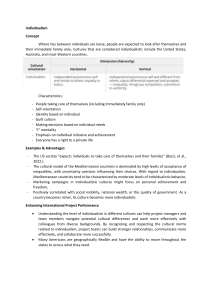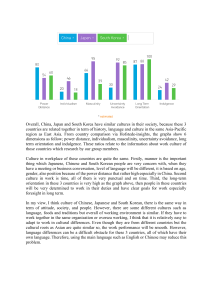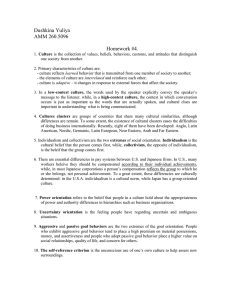
1. Which dimension (of the six) has the largest difference between the US score and the country mentioned in the case study? Present the scores and explain the difference? Overall, individualism is the most difference between the US and other countries which is the highest Individualism: this dimension is the degree of interdependence a society maintains among its members. It has to do with whether people's self-image is defined in terms of "I" or "We". In Individualist societies people are supposed to look after themselves and their direct family only. In Collectivist societies people belong to 'in groups' that take care of them in exchange for loyalty.(Nguồn) Thanks to the definition of individualism, it is easy to understand the reason for the high score of individualism in America. This number reflects the fact that Americans highly respect and promote equality, personal freedom and justice for everyone. Everyone is treated equally, with the same level of respect and has equal rights in life. Furthermore, In American’s idea, each person is a completely independent and autonomous entity. Every single person is a separate entity, not a representative of a family, community or any other group. And within the exchange-based world of work in the US, hiring, promotion and decision are primarily based on performance, merit or evidence of what one has done or can do. A few common characteristics of individualistic cultures include: - Being dependent upon others is often considered shameful or embarrassing - Independence is highly valued - Individual rights take center stage - People often place a greater emphasis on standing out and being unique - People tend to be self-reliant - The rights of individuals tend to take a higher precedence Accordingly, it can be said that Americans are the best joiners in the world, they feel easy and accustomed to communicating and doing business with complete strangers. They are not afraid to approach and interact with their partners to be able to collect and search for information. However, this idea makes it difficult for Americans to find relationships that are sincere and deep enough in real life, especially men. Therefore, it can be seen that social connections in America are relatively loose in that people often only focus on paying attention to themselves or their families without depending (too much) on support from outsiders or even the government. Meanwhile, in the individualism dimension in the others (Brazil, China, India) have quite low scores of Individualism with approximate scores (respectively 69,80,77). These 3 countries could have a tendency to be collectivist nations in which the success of a team has a strong relationship with the success of each individual, hence, a person has a great responsibility towards his or her group. Moreover, harmony and loyalty are highly valued; and there is a clear distinction between "in-group" and "out-group". This idea leads to the interdependence in a community, or between subordinates and superiors lower which enhance the power distance in those countries because in their perspective, friendship is for life, they are scared of displeasing someone. Take amazon as an example, Amazon's India approach is to look for more partnerships with Indian sellers and incorporate them into its global trading network. Having a group of Indian sellers could build the confidence and trust for Indian customers in the beginning stage. Furthermore, Amazon also concentrated on the shopping behavior of Chinese that Chinese user often accessed and posted product reviews and buy. don't buy product advice from “key opinion leaders". and friends and saw advertisements of featured products from retailers to build the appropriate strategy for their market penetration. All of them are based on the collectivistic cultures of these countries. Besides, It is noticeable that there is a reciprocal relationship between 2 dimension Power distance and Individualism, specifically, the higher the score of individualism is, the lower the score of power distance in that country is . To be more detail, power distance dimension reflects the fact that everybody is unique implies that we are all unequal. In these aspects, power being defined as the degree to which a person is able to influence other people’s ideas and behavior. One of the most salient aspects of inequality is the degree of power each person exerts or can exert over other persons. In conclusion, the largest difference between US score and the countries mentioned in case study is individualism 2. How do you prepare for those differences if you plan to visit these countries in the near future? China – Get familiar with collectivism: Realize that in China, people place great importance on prioritizing group interests and maintaining harmony in social interactions, instead of focusing on individualism core. China is known for its collectivist culture, which places emphasis on groups and communities rather than individual interests. Therefore focus on harmony in family, community and group. Consider the needs and values of the group rather than individual desires. Understand that family relationships and personal connections are important in professional settings and that decisions may be influenced by those relationships. – Take the time to establish connections and build good relationships with the people you meet in China. Networking and developing personal connections, known as guanxi, can be beneficial in many different aspects of life, including business. – Show respect for hierarchical and in-group relationships: In China, there is a relatively high power distance culture. Hierarchical relationships are respected and expected. When interacting with Chinese people, show respect to authority figures, elders, and people in power. Speak to people using their appropriate titles and maintain an attitude of formality and respect in professional and social settings. Acknowledge and honor hierarchical structures and relationships within specific groups in Chinese society. – Be open and adaptable: Realize that Chinese culture may differ significantly from your own. Approach these differences with an open mind, embrace them with curiosity rather than judgment, and be willing to adapt to new experiences and ways of working. Additionally, be patient and flexible in the face of uncertainty, and try to maintain a calm and composed demeanor. China typically has a low-indulgence culture, meaning one that focuses on self-discipline and restraint. Avoid excessive displays of emotion and behavior that could be considered indulgent. – Learn some basic Mandarin phrases to aid communication: Although many Chinese people can speak English, especially in urban areas, knowing a few local phrases can be appreciated. Study Chinese etiquette and customs, such as proper gift-giving habits, dining etiquette, and the importance of saving face in interactions. Respect traditional customs and practices, such as bowing, using both hands when giving or receiving things, and taking off your shoes before entering someone else's home. Be open to experiencing local customs, cuisine and traditions. Chinese culture is rich and diverse, so take advantage of the opportunity to learn and explore. Brazil – Establish relationships based on trust: Take time to develop personal connections and engage in casual conversations before diving into business discussions. Show openness, friendliness, and a genuine interest in getting to know people. Be prepared to participate in social activities and enjoy the moment with the locals. – Detailed and complex communication style: Brazilians often provide broad context and prefer face-to-face conversations. When communicating, be prepared to actively listen and express yourself clearly and comprehensively. Avoid speaking too directly or hastily in conversations. – Brazil generally has a moderate power distance culture, which means that although hierarchy still exists, it is not as pronounced as in some other countries. Speak to people respectfully, especially those in positions of authority or elders. Maintain a friendly and approachable attitude because Brazilians value interpersonal relationships. – Brazil is known for its collectivist culture, emphasizing social connection and strong family ties. Be willing to value and respect relationships and consider the needs of the group over personal interests. Additionally, it is important to understand that the family holds a central place in Brazilian culture. Expect strong family ties and involvement of extended family members in various aspects of life, including business matters. – Learn some Portuguese phrases or expressions: While many Brazilians in urban areas speak English, especially in tourist areas, knowing a little Portuguese can go a long way in building relationships. Become familiar with Brazilian customs, including appropriate greetings, dining etiquette, and how to address people based on their social status or age. Respect the importance of personal space, as Brazilians tend to be affectionate and enjoy physical contact during conversations, such as hugs and cheek kisses. Be open to experiencing diverse cultural traditions, such as samba music, capoeira, and unique dishes from different regions of Brazil. United States When visiting the United States, there are some crucial notes that we need to prepare such as: – Direct communication: The primary importance of direct communication when working with Americans is that they value clarity and efficiency. They prefer straightforward conversations that get to the point, so it's important to communicate directly to ensure accurate understanding and avoid misinterpretation. Direct communication also fosters transparency and honesty, as Americans appreciate open discussions and the sharing of both positive and negative information. By being direct, you can express your opinions, concerns, or feedback openly, which helps to build trust and credibility in the working relationship. – Punctuality: This element is also crucial when hanging out with Americans. Americans see punctuality as a sign of respect for others' time and commitments. It is considered unprofessional and disrespectful to consistently arrive late or keep others waiting. Being punctual is not only valued, but it also helps to ensure smooth coordination, avoid delays, and meet deadlines effectively. – Informality : Informality is also highly valued. It is reflected in the way people dress, address each other by their first names, and engage in friendly conversations beyond work-related topics. This informality helps to create a more open and approachable environment, where people feel comfortable sharing ideas and collaborating. – Knowledge about different cultures: To acknowledge and show sensitivity to the cultural diversity in the United States, it is important to educate oneself about different cultures, respect and embrace differences, listen and learn from others' experiences and stories, use inclusive language, participate and celebrate diversity, challenge bias and discrimination, foster cross-cultural relationships, consider privilege and power dynamics, and engage in continuous learning and growth. – Seek knowledge about local business protocols: It is crucial to noticed this feature in the United States because it helps to navigate and respect cultural differences, demonstrate professionalism, build relationships, comply with legal requirements, adhere to business etiquette, and avoid causing unintended offense. Each region in the United States may have its own set of cultural norms and practices, so being knowledgeable about local business protocols helps to adapt and succeed in different business environments. India To ensure a successful visit to India, it is important to make the following preparations: – Dual Cultural Dynamics: India exhibits a mix of both individualistic and collective tendencies. Understanding this cultural dynamic is crucial for effective communication and negotiation. Acknowledge the collective sense of community and strong familial ties, as well as the underlying individualistic streak influenced by religious and philosophical beliefs. This awareness will help you navigate conversations without leaning too far in one direction. – Value Relationships and Hierarchies: Indians place a high value on relationships, particularly in the business environment. Establishing connections through trusted mutual connections can greatly enhance the success of meetings and negotiations. Additionally, it is important to be mindful of hierarchies within organizations and social settings. Show respect to elders and individuals in positions of authority to foster positive interactions. – Family-Oriented Discussions: In India, conversations often revolve around family matters, even in business settings. Indians have a strong connection to their familial roots. Prepare to engage in discussions about family and be receptive to sharing personal anecdotes. This can help foster stronger connections and build rapport. – Dress Conservatively and Respectfully: India is culturally diverse, with each region having its own dress codes influenced by various religions and traditions. When visiting, it is advisable to dress conservatively, especially in business settings. For women, avoiding very short skirts or revealing blouses is recommended. Men should opt for formal attire during business meetings. – Respect Religious sensitivities: India is home to a wide range of religious beliefs and practices. Show respect for these beliefs by being aware of dietary preferences and restrictions. For example, many Hindus do not consume beef, while many Muslims refrain from pork. Being mindful of these sensitivities, particularly during dining experiences, will contribute to positive interactions. – Language Courtesy: While English is widely spoken in India, especially in business settings, learning a few basic phrases in the local language, such as Hindi, can be seen as a gesture of respect and goodwill. It shows an effort to connect with the local culture and people. By preparing in these ways, you can enhance your understanding and appreciation of Indian culture, leading to a more successful and enriching visit. 3. What are 2 tips you feel are most meaningful to remember when wanting to do business with these countries? One of the most significant differences among countries lies in the dimensions of individualism and power distance. These cultural dimensions have a profound impact on various aspects of society, including social interactions, work dynamics, and business practices. Understanding and navigating these differences is crucial for successful cross-cultural communication and collaboration. When wanting to do business with countries that have significant differences in individualism and power distance, here are two meaningful tips to keep in mind: Understand cultural nuances: Cultural intelligence is essential when doing business with countries that vary in individualism and power distance. Take the time to learn about the cultural norms, values, and communication styles of the specific country you are engaging with. Understand how these cultural dimensions influence business practices, decision-making processes, and expectations. By demonstrating cultural sensitivity and adapting your approach accordingly, you can build trust and foster successful business relationships. Adapt your leadership and communication styles: Recognize that leadership and communication styles that work well in individualistic cultures may not be as effective in high power distance cultures, and vice versa. For individualistic cultures, encourage open dialogue, active participation, and empowerment of individuals. Foster a collaborative and inclusive environment where diverse perspectives are valued. In high power distance cultures, demonstrate respect for authority and hierarchical structures. Adapt your communication style to be more indirect and considerate of social hierarchies. Encourage active listening and provide clear guidance and instructions. By understanding and adapting to the cultural nuances of individualism and power distance, you can navigate these differences and create a conducive environment for successful business interactions. Remember that building strong relationships, demonstrating respect, and fostering open communication are key elements in conducting business effectively with these countries. These are specific notes that countries need to keep in mind when participating in investment business in the 3 following countries: India: Respect Hierarchy and Build Relationships: India has a high power distance culture, meaning there is a significant gap between those in authority and subordinates. It's essential to show respect for hierarchy, address people by their titles, and seek approval from senior figures before making significant decisions. Building personal relationships, often through social interactions outside of the workplace, is crucial in Indian business culture. Emphasize Group Over Individual: Indian culture leans towards collectivism. In business, decisions are often made by consensus, and teamwork is highly valued. When presenting proposals or negotiating, focus on how your ideas benefit the group or organization as a whole. Show an understanding of the interconnectedness of individuals within the workplace. America: Embrace Individualism: The United States is known for its individualistic culture. Encourage individual initiative, innovation, and entrepreneurship in your business dealings. Highlight personal achievements and how they contribute to the organization's success. American business culture values assertiveness and self-promotion. Minimize Hierarchy: In contrast to high power distance cultures, the U.S. tends to have a relatively low power distance. In meetings or negotiations, it's acceptable to address others by their first names, regardless of their position. Encourage open and direct communication, and don't be afraid to challenge ideas or decisions constructively. Brazil: Embrace Relationships and Social Engagement: Brazilian culture places a strong emphasis on relationships and social connections. Building trust and rapport is essential in business. Engage in social events, such as dinners and informal gatherings, to foster stronger business relationships. Personal connections often play a significant role in decision-making. Respect Hierarchy, but Flexibility Matters: Brazil typically has a moderate power distance culture. While hierarchy is respected, it's also essential to be flexible and adapt to local customs and informal practices. Be aware of the informal power structures that may exist within organizations and respect the influence of senior figures. China: Build Strong Relationships: Chinese people make a high value on relationships. In others word, China’s society is considered to be a collectivist culture. Building strong relationships, known as guanxi, is crucial in Chinese business culture. Take the time to develop personal connections with your Chinese counterparts, clients, and partners. This involves socializing outside of work, attending events, and showing genuine interest in their culture and traditions. Maintaining long-term relationships is highly valued in Chinese business culture and can greatly enhance your business prospects. Respect Hierarchy: China has a relatively high PDI score, indicating that the Chinese value and accept hierarchical structures and authority. Understand and respect the hierarchical structure in Chinese business settings. Show deference and respect to those in higher positions and acknowledge their authority can help you make a good deal when launching your business in China.







